Michler's ketone
Synonym(s):4,4′-Bis(dimethylamino)benzophenone;4,4′-Bis(dimethylamino)-benzophenone;N,N,N,N′-Tetramethyl-4,4′-diaminobenzophenone, Michler ketone
- CAS NO.:90-94-8
- Empirical Formula: C17H20N2O
- Molecular Weight: 268.35
- MDL number: MFCD00008312
- EINECS: 202-027-5
- SAFETY DATA SHEET (SDS)
- Update Date: 2024-12-18 14:07:02
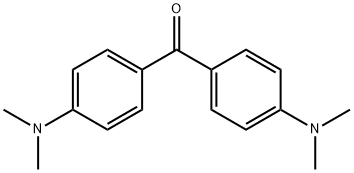
What is Michler's ketone?
Description
Michler's ketone is a blue powder or white togreen-colored leaflet material. Molecular weight = 268.37;Boiling point ≥360℃ (decomposition); Freezing/Meltingpoint= 172-176*C; Flash point = 220-C; Autoignitiontemperature = 480PC. Hazard Identification (based onNFPA-704 M Rating System): Health 3, Flammability 1,Reactivity 0. Insoluble in water.
Chemical properties
white to light greenish crystals
Chemical properties
Michler’s ketone is a is a blue powder or white to green-colored leaflet material.
The Uses of Michler's ketone
In manufacture of dyes and pigments.
The Uses of Michler's ketone
MK can be used as an additive that acts as a photoinitiator in the preparation of dyes. It can also be used as a precursor material in the synthesis of 4,4′-bis{N,N,dimethyl, N (2-ethoxy carbonyl-1-propenyl) ammonium hexafluoro antimonate}benzophenone (MKEA).
What are the applications of Application
Michler′s ketone is a benzophenone derivative and photosensitizer
Definition
ChEBI: 4,4'-Bis(dimethylamino)benzophenone is a member of benzophenones.
Synthesis Reference(s)
Tetrahedron, 38, p. 1163, 1982 DOI: 10.1016/0040-4020(82)85099-0
General Description
White to greenish crystalline leaflets or blue powder.
Air & Water Reactions
Insoluble in water.
Reactivity Profile
4,4'-Bis(dimethylamino)benzophenone is incompatible with strong oxidizing agents and strong reducing agents .
Hazard
Possible carcinogen.
Fire Hazard
Literature sources indicate that 4,4'-Bis(dimethylamino)benzophenone is combustible.
Safety Profile
Confirmed human carcinogen with experimental carcinogenic and neoplastigenic data. A poison by ingestion. Mutation data reported. A flammable liquid. When heated to decomposition it emits toxic fumes of NOx.
Potential Exposure
Mutagen. Animal Carcinogen. Michler’s ketone is a dye intermediate and derivative of dimethylaniline. It is also used in antifreeze formulations, cosmetics, cleaning compounds; heat transfer fluids; as a chemical intermediate in the synthesis of at least 13 dyes and pigments, especially auramine derivatives.
First aid
Skin Contacr52: Flood all areas of body thathave contacted the substance with water.Do not wait tofemove contaminated clothing; do it under the water stream.Use soapto help assure removal. Isolate contaminatedclothing when removed to prevent contact by others. EyeContact: Remove any contact Tenses at once. Immediatelyflush eyes well with copious quantities of water or normalsaline for at least 20- 30 min. Seek medical attention.Imhalation: Leave contaminated area immediately; breathefresh air. Proper respiratory protection must be supplied toany rescuers. If coughing, difficult breathing. or any othersymptoms develop, seek medical attention at once, even isymptoms develop many hours after exposure. Ingestion: IFunconscious or convulsing, do not induce vomiting or giveanything by mouth. Assure that victim's airway is open andlay him on his side with his head lower than his body andfransport at once to a medical facility. If conscious and noCconvutsing, give a glass of water to dilute the substance. Imedical advice is not readily available, do not inducevomiting, and rush the victim to the nearest medicalfacility.
Carcinogenicity
Michler’s ketone is reasonably anticipated to be a human cagen based on sufficient evidence of carcinogenicity from stud rcinoies in experimental animals.
storage
Color Code—Blue: Health Hazard/Poison: Storein a secure poison location. Prior to working with thischemical you should be trained on its proper handling andstorage. Store in a refrigerator or a cool, dry place awayfrom peroxides, aldehydes, strong acids. Where possible,automatically pump liquid from drums or other storage containers to process containers. A regulated, marked areashould be established where this chemical is handled, used,or stored in compliance with OSHA Standard 1910.1045.
Shipping
UN3143 Dyes, solid, toxic, n.o.s. or Dye intermediates, solid, toxic, n.o.s., Hazard Class: 6.1; Labels: 6.1-Poison Inhalation Hazard. UN2811 Toxic solids, organic, n.o.s., Hazard Class: 6.1; Labels: 6.1-Poisonous materials, Technical Name Required. UN1602 Dyes, liquid, toxic, n.o.s or Dye intermediates, liquid, toxic, n.o.s., Hazard Class: 6.1; Labels: 6.1-Poisonous materials.
Purification Methods
Dissolve the ketone in dilute HCl, filter and precipitate it by adding ammonia (to remove water-insoluble impurities such as benzophenone). Then crystallise it from EtOH or pet ether. [Suppan J Chem Soc, Faraday Trans1 71 539 1975.] It is also purified by dissolving in *benzene, then washing with water until the aqueous phase is colourless. The *benzene is evaporated off, and the residue is recrystallised three times from *benzene and EtOH [Hoshino & Kogure J Phys Chem 72 417 1988]. [Beilstein 14 IV 255.]
Incompatibilities
Incompatible with oxidizers (chlorates, nitrates, peroxides, permanganates, perchlorates, chlorine, bromine, fluorine, etc.); contact may cause fires or explosions. Keep away from aldehydes, alkaline materials, strong acids, strong bases, strong reducing agents such as hydrideds and active metals. Contact with hydrogen peroxide may form heat- and shock- sensitive explosives.
Waste Disposal
Do not discharge into drains or sewers. Consult with environmental regulatory agencies for guidance on acceptable disposal practices. If allowed, Incineration with effluent gas scrubbing is recommended. Containers must be disposed of properly by following package label directions or by contacting your local or federal environmental control agency, or by contacting your regional EPA office.
Properties of Michler's ketone
| Melting point: | 174 -176 °C(lit.) |
| Boiling point: | 360 °C |
| Density | 1.0208 (rough estimate) |
| refractive index | 1.5486 (estimate) |
| Flash point: | 220 °C |
| storage temp. | Store below +30°C. |
| solubility | ethanol: 5 mg/mL, clear |
| pka | 2.55±0.12(Predicted) |
| form | Powder |
| color | Blue to dark blue or gray |
| Water Solubility | 400 mg/L (20 ºC) |
| Merck | 14,6177 |
| BRN | 790733 |
| Stability: | Stable. Combustible. Incompatible with strong oxidizing agents, strong reducing agents. |
| CAS DataBase Reference | 90-94-8(CAS DataBase Reference) |
| NIST Chemistry Reference | Methanone, bis[4-(dimethylamino)phenyl]-(90-94-8) |
| IARC | 2B (Vol. 99) 2010 |
| EPA Substance Registry System | Michler's ketone (90-94-8) |
Safety information for Michler's ketone
| Signal word | Danger |
| Pictogram(s) |
 Corrosion Corrosives GHS05  Health Hazard GHS08 |
| GHS Hazard Statements |
H318:Serious eye damage/eye irritation H341:Germ cell mutagenicity H350:Carcinogenicity |
| Precautionary Statement Codes |
P201:Obtain special instructions before use. P280:Wear protective gloves/protective clothing/eye protection/face protection. P308+P313:IF exposed or concerned: Get medical advice/attention. |
Computed Descriptors for Michler's ketone
| InChIKey | VVBLNCFGVYUYGU-UHFFFAOYSA-N |
Michler's ketone manufacturer
ARRAKIS INDUSTRIES LLP
New Products
Tert-butyl bis(2-chloroethyl)carbamate (S)-3-Aminobutanenitrile hydrochloride N-Boc-D-alaninol N-BOC-D/L-ALANINOL N-octanoyl benzotriazole 4-Hydrazinobenzoic acid 3,4-Dibenzyloxybenzaldehyde 1,1’-CARBONYLDIIMIDAZOLE R-2-BENZYLOXY PROPIONIC ACID 1,1’-CARBONYLDI (1,2-4 TRIAZOLE) 4-HYDROXY BENZYL ALCOHOL 3-NITRO-2-METHYL ANILINE (2-Hydroxyphenyl)acetonitrile 4-Bromopyrazole 5-BROMO-2CYANO PYRIDINE 5,6-Dimethoxyindanone 5-broMo-2-chloro-N-cyclopentylpyriMidin-4-aMine 4-methoxy-3,5-dinitropyridine 2-(Cyanocyclohexyl)acetic acid 2-aminopropyl benzoate hydrochloride 1-(4-(aminomethyl)benzyl)urea hydrochloride tert-butyl 4- (ureidomethyl)benzylcarbamate diethyl 2-(2-((tertbutoxycarbonyl)amino) ethyl)malonate Ethyl-2-chloro((4-methoxyphenyl)hydrazono)acetateRelated products of tetrahydrofuran

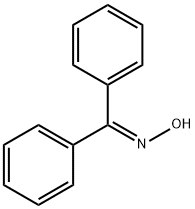

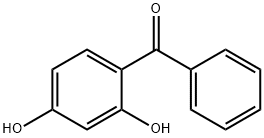
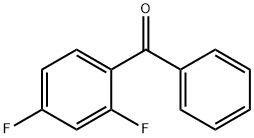
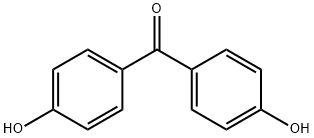
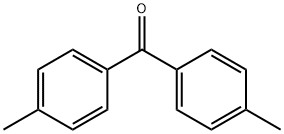

You may like
-
 MICHLERS KETONE 99%View Details
MICHLERS KETONE 99%View Details
90-94-8 -
 4,4'-Bis(dimethylamino)benzophenone CAS 90-94-8View Details
4,4'-Bis(dimethylamino)benzophenone CAS 90-94-8View Details
90-94-8 -
 Michler′s ketone CAS 90-94-8View Details
Michler′s ketone CAS 90-94-8View Details
90-94-8 -
 4,4′-Bis(dimethylamino)-benzophenone CAS 90-94-8View Details
4,4′-Bis(dimethylamino)-benzophenone CAS 90-94-8View Details
90-94-8 -
 N-Vinylformamide 99%View Details
N-Vinylformamide 99%View Details
13162-05-5 -
 Chloro Uracil 1820-81-1 99%View Details
Chloro Uracil 1820-81-1 99%View Details
1820-81-1 -
 2-ethyl-6-methyl-3-hydroxypyridine succinate 99%View Details
2-ethyl-6-methyl-3-hydroxypyridine succinate 99%View Details
127464-43-1 -
 2-ETHYLPYRIDINE 100-71-0 99%View Details
2-ETHYLPYRIDINE 100-71-0 99%View Details
100-71-0